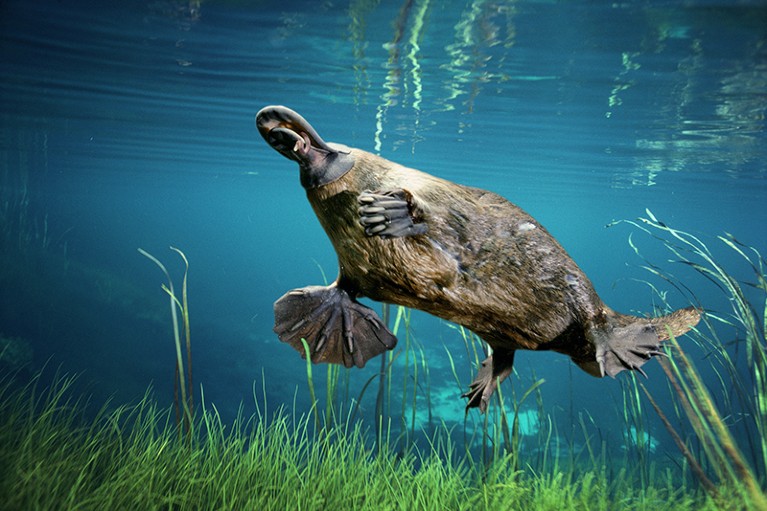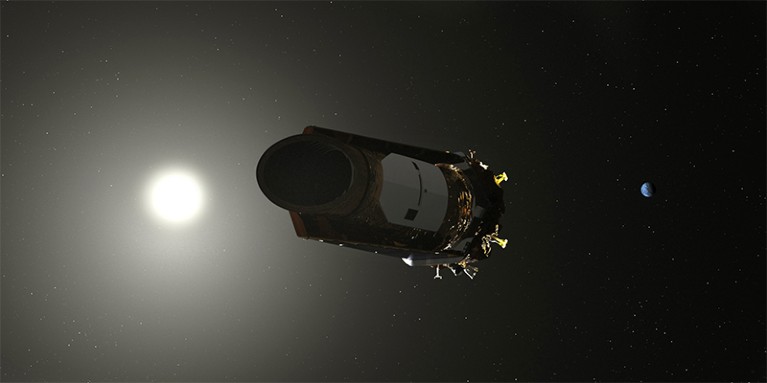EVENTS
Bold genome project kicks off An ambitious effort to sequence the genome of every complex organism on Earth was launched on 1 November in London. The Earth BioGenome Project aims to decode the genomes of the roughly 1.5 million known animal (pictured, composite image of platypus), plant, protozoan and fungal species — the eukaryotes — over the next decade, at an estimated cost of US$4.7 billion. As part of the effort, scientists at the Wellcome Sanger Institute in Hinxton, UK, have committed up to £50 million (US$65 million) over 8 years to sequence the genomes of the eukaryotic species in the United Kingdom, thought to number about 66,000 — among the largest commitments to the effort yet made. At the London meeting, participants thrashed out guidelines for sample collection, sequencing and data curation and sharing.

A composite image of a duck-billed platypus, one of the few complex organisms whose genomes have already been sequenced.Credit: Dave Watts/Nature Picture Library
Ebola vaccine On 2 November, the Uganda Ministry of Health announced that it would give the experimental Ebola vaccine, rVSV-ZEBOV, to around 3,000 people at high risk of infection near the country’s border with the Democratic Republic of the Congo (DRC). Uganda has not yet confirmed any Ebola cases, but the outbreak in the DRC is spreading and the World Health Organization (WHO) says there’s a high risk of it reaching neighbouring countries. As of 3 November, the DRC had reported 298 cases and 186 deaths, including one in a previously unaffected part of the country. The number of infections has increased by roughly 50% over the past 4 weeks, according to the WHO. In the past week, the neighbouring Republic of the Congo, South Sudan, Uganda and Yemen have reported suspected Ebola cases.
POLICY
Grant-funding test Australia’s government is set to introduce a ‘national-interest test’ for research projects seeking grant funding from next year. The policy will require researchers to outline how their project will advance the country’s interests, said education minister Dan Tehan in a statement on 31 October. The test will apply to applications seeking money from the Australian Research Council (ARC), a major funder of science and humanities research. Research groups and academics have criticized the decision, saying that grant assessments already demand a description of a project’s potential benefits. The policy announcement came days after news emerged that the previous education minister, Simon Birmingham, used his authority to reject 11 grant applications that had been recommended for ARC funding by independent peer-review panels in 2017 and 2018.
Boost for Plan S Two of the world’s largest biomedical research funders have backed a plan to make all papers resulting from work they fund open-access (OA) on publication by 2020. On 5 November, the London-based Wellcome Trust and the Bill and Melinda Gates Foundation in Seattle, Washington, endorsed ‘Plan S’, adding their weight to the initiative, which is already backed by 13 research funders from across Europe. Plan S was launched in September and is spearheaded by Robert-Jan Smits, the European Commission’s special envoy on OA. The Wellcome Trust, which gave out £1.1 billion (US$1.4 billion) in grants in 2016–17, is also the first funder to detail how it intends to implement Plan S. It already has an OA policy, but it allows an embargo of up to six months after publication before papers have to be made free to read. It now says that by 2020, it will ban such embargoes. Wellcome-funded work will not be able to appear in subscription journals unless these publications permit papers to be published under OA terms. Wellcome will also stop providing OA funds for ‘hybrid’ journals, but it will not bar publication in them if scientists can pay for it themselves.
Gender protest More than 1,600 scientists in the United States sent a letter to the US Department of Health and Human Services (HHS) on 2 November, condemning the department’s recently revealed proposal to define whether a person is male or female by their genitals at birth. The presidents of three biological societies, which together represent more than 3,000 scientists, sent a similar letter to the HHS last week. The researchers reject the government’s argument that its proposal is based on science. They say that the science linking genetics, anatomy and gender identity is complex and still unclear, and that implementing the policy would erase protections for and identities of millions of people who do not identify with their sex assigned at birth — including those who are transgender or intersex. The proposed change would apply to Title IX, a US civil-rights law that bans discrimination on the basis of sex in education programmes that receive government funds.
FACILITIES
Lost in space NASA officials pronounced two of the agency’s long-running space missions dead after the spacecraft ran out of fuel last month. On 30 October, NASA announced that its Kepler space telescope (pictured) had ceased science operations. Since its 2009 launch, Kepler has discovered more than 2,680 confirmed planets beyond the Solar System, including Kepler-186f, an Earth-sized planet in the habitable zone. The telescope also spotted thousands of other potential worlds that are awaiting confirmation. And on 31 October, when the Dawn spacecraft failed to make contact with Earth from its orbit around the asteroid Ceres, mission managers concluded that it, too, had stopped functioning. Launched in 2007, Dawn visited two big asteroids — Vesta in 2011 and Ceres in 2015 — the first probe to orbit two objects beyond Earth.

NASA's Kepler space telescope has spotted thousands of planets beyond the Solar System.Credit: NASA
India’s neutrino lab Long-delayed efforts to build a major neutrino observatory in India cleared a legal hurdle on 2 November, when the country’s National Green Tribunal upheld environmental clearance for the project. The clearance had been challenged by activists, who say that excavation will affect wildlife and resources. The 15-billion-rupee (US$206-million) facility, called the India-based Neutrino Observatory, is set to be built under 1.2 kilometres of rock in the southern state of Tamil Nadu. Physicists hope that the detector will help them to elucidate the relative masses of neutrinos, elusive particles produced when cosmic rays strike the atmosphere. India’s government approved funding for the project in 2015, but the experiment has been opposed by environmentalists and local politicians. Before construction can begin, the project must also gain approvals from wildlife and pollution boards.
PEOPLE
‘Noteworthy’ figure A scientist will grace Britain’s next £50 banknote — and the public has the chance to suggest who it should be. The Bank of England is looking for a UK scientist to replace the industrialists Matthew Boulton and James Watt on the next iteration of the note, which will be printed on a polymer material for the first time. Nominations can be made through the bank’s website until 14 December, and proposed scientists must be dead. An advisory committee — including four scientists — will then whittle down the list to a few names. The bank’s governor, Mark Carney, will make the final decision, which will be announced in 2019.
Sanger probe The Wellcome Sanger Institute in Hinxton, UK, has dismissed allegations that its high-profile director, geneticist Mike Stratton, bullied staff, discriminated against them because of their gender and misused funds. On 30 October, the institute, one of the world’s top genomics centres, announced that an investigation had cleared Sanger’s management, in particular Stratton, of these accusations. Carried out by the barrister Thomas Kibling at Matrix Chambers, London, the investigation did identify “failings in the way in which people have been managed”, and a lack of diversity at senior levels of the organization. In a statement, Stratton apologized for “failures in people management that have occurred and have had unintended detrimental effects on individuals.”
TREND WATCH
Unpaid research stints are common in sub-Saharan Africa, according to an online survey of 412 academics that spanned 6 countries. Eighty-five per cent of respondents report having had research positions with no pay. Of those, 33% had spent between 1 and 5 years doing research for free, and 4% had spent more than 5 years doing so. Many researchers on the continent work with organizations out of personal interest or to contribute to a specific cause, says Lem Ngongalah, head of the Collaboration for Research Excellence in Africa in Douala, Cameroon, which posted the results on 17 October (L. Ngongalah et al. Preprint at bioRxiv http://doi.org/cwr9; 2018). “In many cases, there is no payment for such work, because the organization itself has no funding for the work it does,” she says. “Funding continues to be a significant challenge for research in Africa.” The respondents — who come from Cameroon, Nigeria, Kenya, Uganda, Tanzania and South Africa — also identified other barriers to conducting research in Africa, including a shortage of training facilities and a loss of motivation to continue research.

Source: L. Ngongalah et al. Preprint at bioRxiv http://doi.org/cwr9 (2018).



